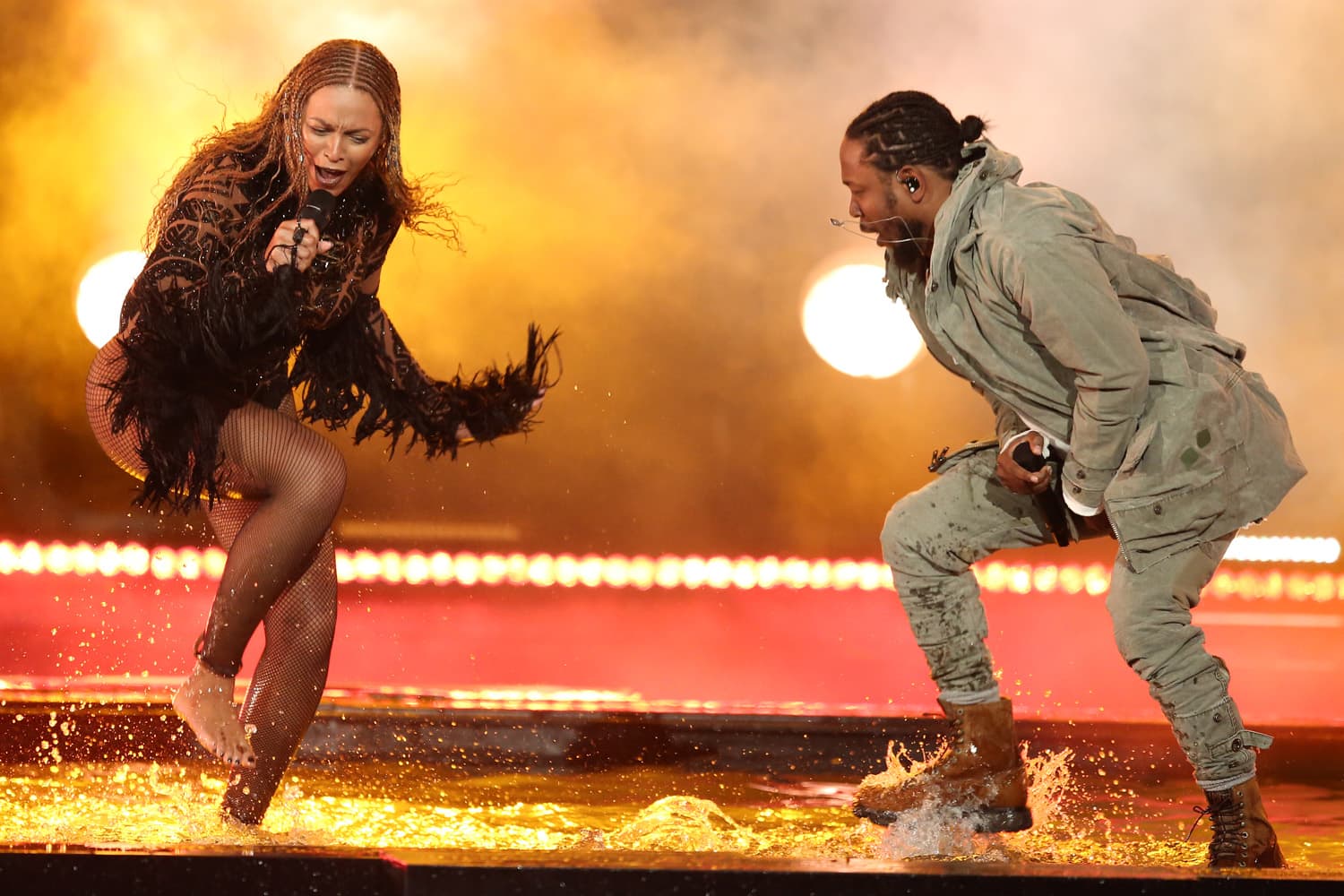Advertisement
Kendrick Wins And Beyoncé Shines: A Historic Week For Black Musicians
Resume
With Melissa Block
Kendrick Lamar scores a Pulitzer. Beyoncé stuns us with her performance at Coachella. We'll talk about what a big week it's been for black musicians.
Guests:
David Hajdu, Music critic for The Nation and 2018 Pulitzer music juror. The jury unanimously selected Kendrick Lamar’s DAMN. for the 2018 Pulitzer Prize for Music. (@davidhajdu_)
Rodney Carmichael, NPR Music hip-hop correspondent. (@free_c_mike)
Fredara Hadley, Visiting professor of ethnomusicology at Oberlin College. (@fredaraMareva)
Highlights:
On Lamar's DAMN.:
Hajdu: "We hear really smart, sophisticated language that works on multiple levels. It's just great hip-hop, it's just great at what it is... that's one of the things that spoke to us about it." From the Pulitzer website: "... a virtuosic song collection unified by its vernacular authenticity and rhythmic dynamism that offers affecting vignettes capturing the complexity of modern African-American life."
Hadley: "DAMN. is a really nice cruising altitude for him where it's a not a complete departure, but you can mark the growth... The only comparison I make is a group like Outkast, from the 1990s, who were able to do similar innovation within their own style."
I feel like he's really a modern-day prophet, and you see him doing the work that prophets have always done throughout history...
Rodney Carmichael, on Kendrick Lamar
Carmichael: "[Lamar] is such a tormented figure throughout this album, and he's struggling with his faith in what he feels like is a faithless society and a faithless time. I feel like he's really a modern-day prophet, and you see him doing the work that prophets have always done throughout history, going all the way back to biblical times. Prophets usually weren't celebrated... The assignment that they felt like had been heaped upon them was something that they had struggled with a lot. And I think you hear a lot of that struggle in songs like 'FEEL.' and throughout the album."
On Beyonce's Coachella performance:
Hadley: "What she chose to do in reimagining her entire stage show and performance through the lens of musical culture that developed and still exists on the campuses of these historically black colleges, was for me — someone who grew up around that particular culture — was jaw-dropping, and completely unexpected."
Caller comments:
Trip, from Nashville, TN, on Beyonce's performance: "Within the first five minutes, I had big, goopy tears falling from my face... It had so much more to do with the marching band aspect..."
Dan, from Lexington, KY, on celebrating black culture in the context of current events: "It does strike me as such a harsh contrast to see it in the same week. My question is: how do we translate white fans in America who adore and revere and pay money for black celebrities, athletes, actors, and musicians — how do we translate that level of attention and adoration into caring about regular African-American lives, which are not valued in this country at all?"
(Editor's note: A few songs in our playlist contain explicit lyrics.)
From The Reading List:
Billboard: Beyonce's Coachella Set Was a Landmark Celebration of HBCUs & Southern Black Culture -- "Beyoncé may not have attended a HBCU herself or joined a Black sorority, but the feel and execution of her performance rang true with people familiar with HBCU and Black Greek fraternity/sorority traditions because she did more than scan YouTube for inspiration — she brought expert practitioners in-house to reimagine her catalog and stage show as if it were happening at Howard Homecoming instead of Coachella."
NPR.org: How The Pulitzer Jury Opened Its Doors To Hip-Hop -- "Lamar's Pulitzer win may constitute the first time a high-minded institution has seen fit to place an insurgent and equally popular rap artist, in the prime of his career, within America's canon of heralded music composers. It comes at a time increasingly defined by unapologetic blackness, from the cinematic phenomenon of Black Panther (which Lamar coincidentally soundtracked) to last weekend's epic festival black-out now known as Beychella."
It’s been a banner week for black musicians. Hip-hop artist Kendrick Lamar won the Pulitzer Prize for music – for his album DAMN. – which we’re hearing some of now. It’s a milestone: the first Pulitzer ever awarded for music that’s not classical or jazz. And Beyoncé becomes the first black woman ever to headline the Coachella music festival – where she wows with an epic set.
This hour, On Point: Kendrick Lamar. Beyoncé. And more.
-- Melissa Block
This program aired on April 20, 2018.